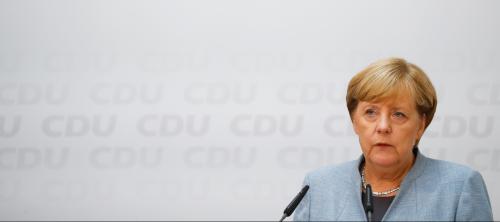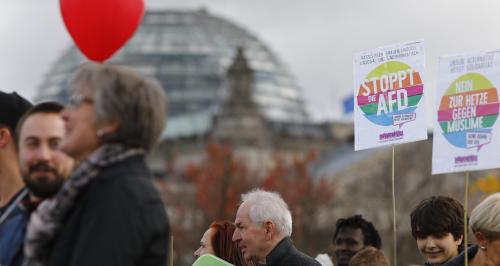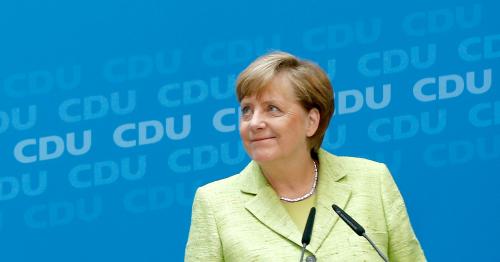An election in the German state of Mecklenburg-Western Pomerania has given the right-wing party Alternative for Germany (AfD) 20.8 percent of the vote. It sent a nervous shudder throughout the country, writes Constanze Stelzenmüller, shocking allies and neighbors. Could this be the twilight of Chancellor Angela Merkel’s nearly 12-year reign? This article originally appeared in the Washington Post.
For years, Germany seemed immune to the forces of populist discontent raging on both sides of the Atlantic, a lone island of calm and stability. That ended on Sunday, when an election in the north-eastern state of Mecklenburg-Western Pomerania gave the right-wing party Alternative for Germany (AfD) 20.8 percent of the vote. It sent a nervous shudder throughout the country, shocking allies and neighbors. At home, Chancellor Angela Merkel’s friends and foes alike are suddenly sniffing opportunity, one year out from national elections. Is this the twilight of her nearly 12-year reign?
On the face of it, the state many Germans simply refer to as “Meck-Pomm” is an unlikely candidate for a bellwether of change. Abutting the Baltic Sea, it is quietly lovely but impoverished and sparsely populated; a place of sandy soils, lakes, and pines where time seems to flow in big slow loops. It is the home state of President Joachim Gauck as well as Chancellor Merkel—a fact which its famously taciturn inhabitants appear to regard not so much as a source of civic pride but as proof that nothing good happens to those who leave home and get ahead of themselves. It houses two percent of the country’s citizens, produces 1.3 percent of GDP, and has an unemployment rate of 9 percent (national average: 6). Its few immigrants are mostly Poles or German Russians. Of the million-plus refugees who began arriving a year ago, it has taken in a mere 23,000.
In a speech on Wednesday in Berlin to Germany’s federal legislature, Merkel said the AfD “is a challenge to all of us in this house.” But she added: “I’m very convinced that if we keep our composure and stand by the truth, then we’ll win — and we’ll win back the most important thing we need, the trust of the people.”
Still, there are good reasons for the national jitters. Campaigning on a stridently anti-immigrant ticket, the three-year-old AfD achieved a spectacular second place behind the incumbent Social Democrats—thereby winning a bet on casting the election as a protest referendum on the chancellor’s refugee policy. Worse, this is the first time in postwar history that a populist challenger has overtaken Merkel’s center-right Christian Democrats on the right in one of Germany’s sixteen states and pushed it into third place. That it is home to the chancellor’s own constituency makes for an added sting.
Thomas Schmid, a former left-wing renegade who now writes a thoughtful blog for the conservative daily Die Welt, has suggested that Sunday’s upset is due to democracy and civil society being less firmly rooted in formerly communist East Germany. There is some evidence for that, including startlingly high support for Russia’s President Vladimir Putin. Yet it’s also a somewhat condescending take. East Germans do have legitimate grievances against what they see as an entitled and aloof political establishment. Carpetbaggers from the West who took all the best jobs after unification in 1990 come to mind; and pensions are still lower in the East than in the West, a quarter-century later.
But the AfD is neither a creation of the east, nor is it confined to it. It has fielded candidates in ten of the eleven states that have held elections since its founding in February 2013—five in the West and five in the East. It vaulted over the 5 percent entry threshold in all except one—with double-digit wins in every election held since Merkel welcomed a historic influx of refugees a year ago with the now legendary phrase, wir schaffen das (we can do it). In Mecklenburg, the AfD was able to push voter turnout up by 10 percent and poach voters from all the parties, including the extreme left and right. Even more significantly, it was able to mobilize a large group of non-voters—as it did in the last three regional elections before. No wonder politicians in Berlin are alarmed.
The AfD’s often shambolic and disruptive public image makes it easy to underestimate its impact. It magnifies and manipulates voters’ fears and grievances, but it is not wasting time by attempting to redress them. By all accounts, its state representatives have spent far more time fighting with each other than on making laws.
At the same time, the AfD has undergone a highly deliberate metamorphosis from a Eurosceptic voice on the right to an increasingly nationalist and xenophobic bloc. It does nothing to disassociate itself from anti-semitic, anti-immigrant, racist, or anti-Islamic supporters. It defames fundamental constitutional values and representative democracy. It is reaching out to the conservative mainstream by flaunting its connections to self-proclaimed thinkers of the “New Right.” It is actively seeking to ally itself with extreme rightwing movements at home and abroad, from the local Pegida demonstrations to France’s Marine le Pen or the Netherlands’ Geert Wilders. In nationwide polls, it has consistently been registering 10-14 percent support; not from the dispossessed and disadvantaged, but from middle class men and women raging about social changes they don’t like. No mistake, the AfD is in combat mode. Its target, however, is not class warfare—but the culture wars.
For now, the AfD is still a fringe force. But it is dangerous, and needs to be taken seriously, because it is already putting the established parties on the defensive and changing the terms of the national debate. Its national leaders, who regularly claim that their party represents ‘true’ popular opinion, have made no bones about their ultimate target: “We want to run the country.”
Merkel—who has not declared yet whether she will run again in 2017—appears calmly determined to stay the course despite her sinking popularity figures. She can point to the fact that incoming refugee numbers have dwindled to a trickle, and that the country’s communities have geared up to better integrating those who will stay. And she can take reassurance from the absence of a serious challenger to her stature.
But if she wants to have the choice of running again, she will have to do better at explaining to Germans and their neighbors why her morally admirable decision to let in the refugees is also good for the country, and for Europe. What is at stake is nothing less than the future of both.
The Brookings Institution is committed to quality, independence, and impact.
We are supported by a diverse array of funders. In line with our values and policies, each Brookings publication represents the sole views of its author(s).








Commentary
Merkel’s election woes are a warning to Berlin
September 10, 2016